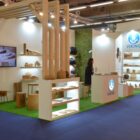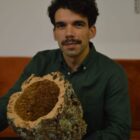Interview for Valor Magazine: 39th edition November 2023
Corticeira Viking has been operating in the market for over 25 years and is dedicated to the production and marketing of cork products for a high range of areas. Renato Espírito Santo, manager associate of the company, explains that cork is a naturalsustainable and, therefore, highly seeked material nowadays for various purposes, either for the industry or for private clients. Find out a little more about this product whose market Portugal leads.
When did the opportunity to produce your own products and deliver the final product to the customer arise?
We decided to integrate the production process at Corticeira Viking – initially dedicated exclusively to the purchase and sale of cork products – gradually and with greater incidence in the last decade. As the business grew, combined with the worldwide affirmation of cork as a sustainable, natural, and renewable material, we started toinvest more in machinery and infrastructures, as well as in the hiring and training of human resources. In this new scenario, it was possible to obtain greater profitability, provide a more efficient response to our customers and depend less and less on subcontractors. On the other hand, producing internally facilitated the design of our own products and the customization of articles, which is one of our strengths.
What type of cork products do you manufacture? home and lifestyle products, or did you also enter the industrial sector?
We like to say that there are no limits to the range of products we can offer, which includes products for table, office, sport, lifestyle, gifts, and other uses. We can produce a yoga block, a wine cooler, a toy or even a cork umbrella. We also sell industrial products, namely for insulation or house cladding.
What processe does cork goes through in order to become the end product that is then purchased by the most varied activity sectors?
The cork life cycle begins with the extraction of the bark from the cork oak, activity that takes place between May and August. After being extracted, the cork goes through several stages that vary according to the final product to which is intended. As an example, the production process of a cork stopper is very different from the manufacturing method of a yoga mat.
Having in its favor the fact that it is sustainable, what care is needed to have, through the cork transformation processes to, not distort this characteristic, due to chemicals, which that can be added to the product during its transformation?
There are several legal standards that regulate the cork sector, which aim to ensure this, that the cork transformation processes do not distort the unique characteristics and benefits of this noble raw material. Systecode through the International Code of Practice Cork Stoppers (CIPR) and HACCP (Hazard Analysis and Critical Points of Control) within the scope of food safety play a fundamental role in this matter.
What analysis do you make of this sector and how it can impose itself, worldwide, to make Portugal an even more leading country in this area? Is innovation crucial to stay at the forefront?
We see the focus on innovation as a crucial factor to boost cork as a versatile raw material capable of numerous applications, and to guarantee the survival of cork companies. The constant threat of TCA’s, synthetic sealants and lack of raw material quality requires the creation of new cork models that satisfy the market needs.
Read the interview for Valor Magazine here: Cortiça: Um material sustentável, natural e uma solução de futuro – Valor Magazine





